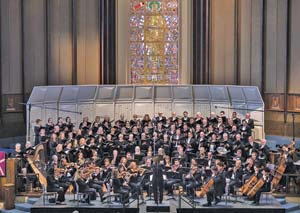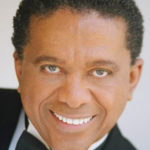
Brahms German Requiem – SB Newspress Review
Homage to those passed, and those left
By JOSEF WOODARD, NEWS-PRESS CORRESPONDENT
April 9, 2017 12:26 AM

The Santa Barbara Choral Society took on Brahms’ haunting German Requiem (David Bazemore Photos)
Last weekend at the First Presbyterian Church, the mighty Santa Barbara Choral Society, abetted by a full orchestra, pulled off an impressive feat, one with roots in classic choral repertoire but with its own special niche.
Brahms’ “Ein Deutsches Requiem” (“A German Requiem”) may be the composer’s crowning achievement, written over more than a decade, and diverting from the Catholic Requiem tradition by basing its text on Lutheran Biblical sources.
Another point of distinction: the work, allegedly inspired by the death of Brahms’ friend and musical comrade Schumann and Brahms’ mother, is aimed at consoling the living, dealing with the loss of loved ones, as much as it is an homage to those passed away as a “prayer for the soul of the dead.” Under the sure guidance of longtime Choral Society director JoAnn Wasserman, and with strong input from soloists, baritone Lester Lynch and soprano Tamara Bevard and the taut mesh of the expansive choir, the roughly 90-minute opus emerged in sublime form here.
It is possible for those of us who have trouble finding a way into the presumed greatness of late Romantic sweep of music by Brahms’ output to fully embrace and be uniquely moved by this choral seven-part masterwork. And so it was at First Presbyterian Church, an ideal setting. Personally, the situation was made all the more powerful and poignant by the recent passing of both my own elderly parents, including my music-loving mother, who would have greatly appreciated this performance.
Ominous and consoling, the work opened boldly with the generous, embracing opening movement, moving into the familiar strains of the second movement, with its Biblical sentiment “for all flesh is like the grass, and all the magnificence of mortals is like the flowers of the grass. The grass has withered, and the flower has fallen away. So now be patient, dear friends, until the life hereafter.”
Mr. Lynch’s sonorous baritone voice was in good stead as he sang, from the church’s pulpit, in the third movement, based on Psalm 39: “Lord, teach me that I must have an end, and that my life has an end, and that I must pass away. Behold my days here are but a handbreath before you, and my life is nothing before you.”
Ms. Bevard demonstrated her own sure, resplendent voice on the tranquil passage of the fifth movement, particularly geared towards comforting those in grief.
In the sixth movement, Mr. Lynch returned to the stage for the intense and dramatic force of a long movement that contains the lyrics “Death is swallowed up in victory. Death, where is your sting? Hell, where is your victory?” before the musical turbulence shifts turns to a stirring, resolving climax. By telling contrast, movement seven, based on Revelations 14:13, is a more understated denouement to the work after the stormy dimensions of what comes before it, rooted in the verse “blessed are the dead who die in the Lord from now on. Yea, the Spirit says that they may rest from their labor, for their works follow after them.”
Listeners of whatever religious, or areligious, persuasion, and of whatever proximity to the loss of a loved one, can easily become swallowed up in the majesty of this music, especially when delivered with the kind of convincing power and precision heard in church last weekend.

 American baritone, Ralph Cato has travelled the world extensively, telling stories in song with his warm, clarion baritone voice.
American baritone, Ralph Cato has travelled the world extensively, telling stories in song with his warm, clarion baritone voice. Tenor, Benjamin Brecher has performed over fifty operatic roles with many of the world’s most prestigious opera companies, specializing in the high lying lyric tenor repertoire. He has performed 16 roles with New York City Opera alone. Career highlights include performances with Opera Orchestra of New York, L’Opera de Nice, Rossini Opera Festival in Pesaro, L’Opera de Montreal, Santa Fe Opera, Opera Theatre of St. Louis, among many others. His orchestral solo repertoire includes Mozart, Handel, Orff, Bach, Haydn, as well as many performances of Britten. In 2000 he began performing the great Irish Tenor songs in a concert produced for him entitled A Celtic Celebration, Twenty years later, the show has become a North American hit with performances with 45 Symphonies in North America. Ben continues his discography having added his twelfth recording in 2016 Forgotten Liszt, with pianist Robert Koenig, and will record a new release in 2022 entitled “Three Centuries of Thomas Moore” including the music of Britten, Berlioz, and Sarah Gibson on MSR Classics. He is a Professor of Voice at University of California Santa Barbara, where he has served as the Head of Voice.
Tenor, Benjamin Brecher has performed over fifty operatic roles with many of the world’s most prestigious opera companies, specializing in the high lying lyric tenor repertoire. He has performed 16 roles with New York City Opera alone. Career highlights include performances with Opera Orchestra of New York, L’Opera de Nice, Rossini Opera Festival in Pesaro, L’Opera de Montreal, Santa Fe Opera, Opera Theatre of St. Louis, among many others. His orchestral solo repertoire includes Mozart, Handel, Orff, Bach, Haydn, as well as many performances of Britten. In 2000 he began performing the great Irish Tenor songs in a concert produced for him entitled A Celtic Celebration, Twenty years later, the show has become a North American hit with performances with 45 Symphonies in North America. Ben continues his discography having added his twelfth recording in 2016 Forgotten Liszt, with pianist Robert Koenig, and will record a new release in 2022 entitled “Three Centuries of Thomas Moore” including the music of Britten, Berlioz, and Sarah Gibson on MSR Classics. He is a Professor of Voice at University of California Santa Barbara, where he has served as the Head of Voice. Born and raised in Southern California, April Amante is a versatile soprano with expertise and facility in repertoire spanning from early music to contemporary musical theater.
Born and raised in Southern California, April Amante is a versatile soprano with expertise and facility in repertoire spanning from early music to contemporary musical theater. Tracy Van Fleet is pleased to return to the Santa Barbara Choral Society. As a soloist, she has performed with the Los Angeles Master Chorale, Lüneburg Symphony in Germany, Orquesta Filarmónica de Boca del Río in Mexico, Pasadena Symphony, Naples Philharmonic, Los Angeles Bach Festival, San Diego Chamber Orchestra, Colorado Philharmonic, USC Symphony and Chorus, and others. She has had many appearances with the Los Angeles Opera, Los Angeles Philharmonic, Pacific Symphony, Hollywood Bowl Orchestra, Opera Pacific, San Diego Opera and Opera Colorado.
Tracy Van Fleet is pleased to return to the Santa Barbara Choral Society. As a soloist, she has performed with the Los Angeles Master Chorale, Lüneburg Symphony in Germany, Orquesta Filarmónica de Boca del Río in Mexico, Pasadena Symphony, Naples Philharmonic, Los Angeles Bach Festival, San Diego Chamber Orchestra, Colorado Philharmonic, USC Symphony and Chorus, and others. She has had many appearances with the Los Angeles Opera, Los Angeles Philharmonic, Pacific Symphony, Hollywood Bowl Orchestra, Opera Pacific, San Diego Opera and Opera Colorado.